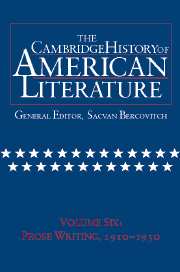Book contents
- Frontmatter
- Introduction
- A Cultural History of the Modern American Novel: Introduction
- 1 A Dream City, Lyric Years, and a Great War
- 2 Fiction in a Tme of Plenty
- 3 The Fate of Writing During the Great Depression
- Fictions of the Harlem Renaissance
- 1 A New Negro?
- 2 Black Manhattan
- 3 Avatars and Manifestos
- 4 Harlem as A State of Mind: Hughes, McKay, Toomer
- 5 A New Negro, A New Woman: Larsen, Fauset, Bonner
- 6 “Dark - Skinned Selves Without Fear or Shame”: Thurman and Nugent
- 7 Genre in The Renaissance: Fisher, Schuyler, Cullen, White, Bontemps
- 8 Southern Daughter, Native Son: Hurston and Wright
- 9 Black Modernism
- Ethnic Modernism
- Chronology
- Bibliography
- Index
7 - Genre in The Renaissance: Fisher, Schuyler, Cullen, White, Bontemps
from Fictions of the Harlem Renaissance
Published online by Cambridge University Press: 28 March 2008
- Frontmatter
- Introduction
- A Cultural History of the Modern American Novel: Introduction
- 1 A Dream City, Lyric Years, and a Great War
- 2 Fiction in a Tme of Plenty
- 3 The Fate of Writing During the Great Depression
- Fictions of the Harlem Renaissance
- 1 A New Negro?
- 2 Black Manhattan
- 3 Avatars and Manifestos
- 4 Harlem as A State of Mind: Hughes, McKay, Toomer
- 5 A New Negro, A New Woman: Larsen, Fauset, Bonner
- 6 “Dark - Skinned Selves Without Fear or Shame”: Thurman and Nugent
- 7 Genre in The Renaissance: Fisher, Schuyler, Cullen, White, Bontemps
- 8 Southern Daughter, Native Son: Hurston and Wright
- 9 Black Modernism
- Ethnic Modernism
- Chronology
- Bibliography
- Index
Summary
Rudolph Fisher surpassed the boundaries of the black middle class. Born in 1897 in Washington, DC, but raised in Providence, Rhode Island, Fisher graduated Phi Beta Kappa from Brown University in biology and English. Subsequently first in his Howard Medical School class of 1924, Fisher took up a postdoctoral fellowship at Columbia University upon graduation. He went on to place articles in medical journals, start up his own radiology practice, work on a musical revue with Langston Hughes, and publish over a dozen short stories, magazine essays, and novels. Fisher’s innovative appropriation of the detective genre and humorous insight into the foibles of urban ways deconstruct life in the “City of Refuge,” the affectionately ironic name Fisher gave to his beloved Harlem.
Fisher’s satiric essay, “The Caucasian Storms Harlem,” portrays the black Mecca as in danger of becoming a tourist trap. Spots once limited to blacks out on the town became, by the middle of the 1920s, nightclubs catering to white folks. If James Weldon Johnson was eager to advertise black Harlem as a culturally rich space teeming with talented and brilliant inhabitants, Fisher had reservations about sharing that space, even as he comically addressed such concerns. Returning to Harlem after a long absence, Fisher relates how he went from club to club seeking a Negro ambience. Instead, he finds himself, again and again, the only black person present: “The best of Harlem’s black cabarets have changed their names and turned white.” Recalling life before the “invasion,” Fisher drops the names of such notables as Paul Robeson, football hero, law student, and international theater star; Bert Williams, vaudeville celebrity; and a young and self-possessed chanteuse named Ethel Waters.
- Type
- Chapter
- Information
- The Cambridge History of American Literature , pp. 332 - 339Publisher: Cambridge University PressPrint publication year: 2002



